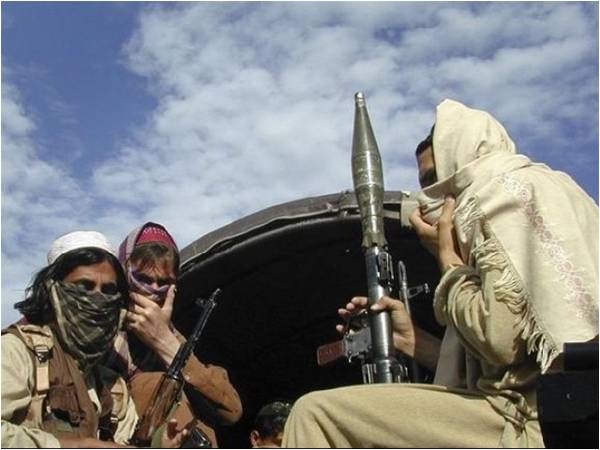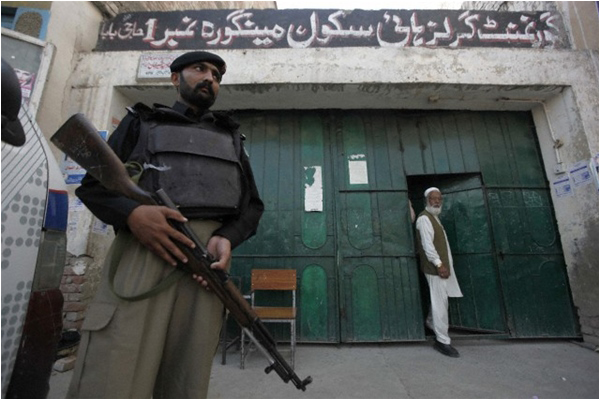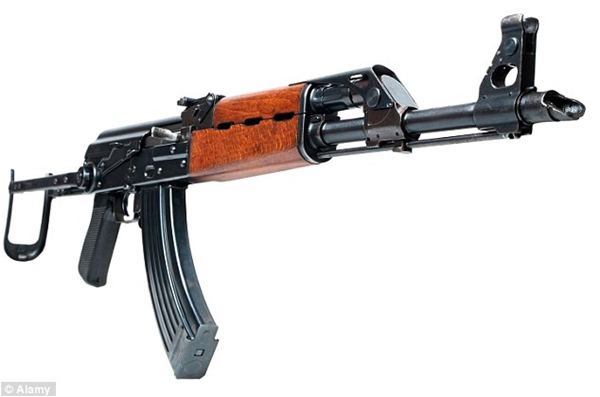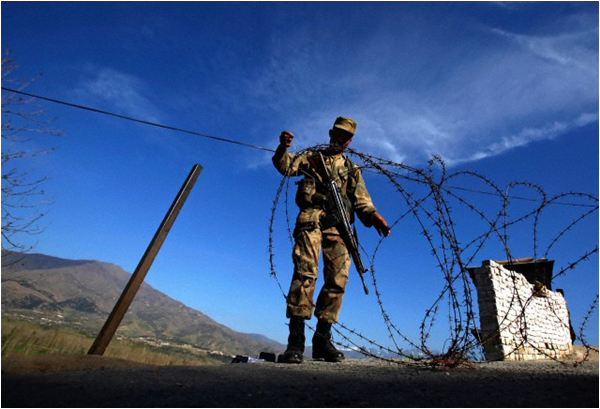
On July 2, unidentified men gunned down Adalat Khan, a local political leader in the Shamozai area of Swat. He was attacked near his house on his way back home from the local bazaar. According to the police, Adalat Khan was shot several times and died on the spot. The attackers managed to flee.
The assassination is the newest in a series of killings in Swat valley. Tribal elders, members of the village defence council (VDC), peace activists and policemen are the targets. Although there have been no visible signs of Taliban and other militant groups in the in the area since the military operation of 2009, the residents say they still live in fear.
“The people of Swat, especially students, live under constant fear after a spate of target killings,” said Sawab Khan, an educationist and president of the Private School Management Association (PSMA) of Swat. He said it had deep negative effects on the learning environment in schools.
According to Niaz Ahmad Khan, a local journalist, local residents have complained of threatening letters, text messages and phone calls claiming to be from the Taliban, usually for the purpose of extortion. “The phone numbers in such cases are either from Afghanistan or from Karachi.”

On June 27, Amir Zeb, the son of a local VDC member, was gunned down near his house in Charbagh area of Swat. The men who claimed responsibility for the killing said that they would kill all VDC members one by one. The threat came as no surprise. At least 26 members of VDCs in Swat were killed in 2014 alone. The total number of victims belonging to the councils is so high that the government plans to establish a monument in Swat Museum “to recognize their services and sacrifices”.
The village defence councils, which consist of thousands of volunteers who work under 225 leaders, were established after the security forces defeated Fazlullah-led militants in 2009 to help law enforcement agencies maintain peace. For almost three years after the operation, they did maintain peace.
But the militants who had fled Swat regrouped across the border in the Kunar and Nuristan provinces of Afghanistan. In 2012, they started attacking Pakistani security forces in the border areas of Dir, Bajaur and Chitral. It was after a gun attack on Malala Yousafzai in broad daylight in Mingora city that the people of Swat began to feel threatened again.
Idrees Khan oversees all the village defence councils in Swat. He has survived two assassination attempts. Some of his relatives have been killed in such attacks. “All around the valley, we have lost more than 40 volunteers,” he says. “But these killings will not hamper our peace struggle. We are determined to keep the terrorists out of our villages.”

According to Idrees, the government had offered to provide security to local elders, but a majority of them rejected the offer, and that made them easy targets. “Anybody threatened by the militants can ask for security, but a majority of the local elders are not interested,” he says. The elders believe security guards will only make them more conspicuous.
Fazal Hayat Chattan, the general secretary of Pakistan People’s Party (PPP) in Swat, was killed in Qambar village near Mingora in November last year. “We had warned the members of Lashkars not to side with the forces but they did not pay heed,” said a statement of claim released after his assassination. “So our only option is to target them.”
Idrees Khan is critical of those who say the military should have returned to their pre-operation positions after the valley had been cleared. “Under the prevailing circumstances, the civil administration cannot maintain law and order in Swat,” he says. “The withdrawal of the army means inviting militants back to the area.”
Zahid Khan, a leader of Swat Qaumi Jirga (SQJ) and president of the All Swat Hotel Association, has survived three assassination attempts, including a bullet wound on the back of his neck after an attack in August 2012. “All those who talk about peace are being targeted,” he said.
Many local elders are confined to their homes. “We can’t go outside, no business, no participation in weddings or funerals, our social life is almost over,” said Zahid Khan who is one of the founding leaders of SQJ. The Jirga, with more than 4,500 members, was the first organization that supported a “focused and targeted” military operation in Swat. But now it wants the transfer of power from the military to the local civil administration.
Zahid Khan says there was no apparent presence of Taliban in the valley, and it is strange that despite such a heavy presence of security forces in the area, people could enter the town, assassinate their targets, and then leave. The only way to reduce fear in the local population is to arrest the culprits and produce them before the media.

District Police Officer (DPO) Muhammad Salim Marwat said police had arrested a number of suspects in connection with target killings. “Recently, during a crackdown, police arrested some suspects from Charbagh area who are being interrogated,” he said. While referring to the killing of Adalat Khan, he said that police had developed some important “links” that could help them get to the killers.
The Morning Post, a website run by a group of journalists in Swat, recently quoted a military official as saying that some suspects in the killings of VDC members had been arrested and would be tried in military courts. “The arrested perpetrators who have carried out massacres of the VDC members will soon be punished in military courts,” he said.
Tahir Ali is an Islamabad-based journalist
Twitter: @tahirafghan
The assassination is the newest in a series of killings in Swat valley. Tribal elders, members of the village defence council (VDC), peace activists and policemen are the targets. Although there have been no visible signs of Taliban and other militant groups in the in the area since the military operation of 2009, the residents say they still live in fear.
At least 26 members of village defence councils were killed in 2014 alone
“The people of Swat, especially students, live under constant fear after a spate of target killings,” said Sawab Khan, an educationist and president of the Private School Management Association (PSMA) of Swat. He said it had deep negative effects on the learning environment in schools.
According to Niaz Ahmad Khan, a local journalist, local residents have complained of threatening letters, text messages and phone calls claiming to be from the Taliban, usually for the purpose of extortion. “The phone numbers in such cases are either from Afghanistan or from Karachi.”

On June 27, Amir Zeb, the son of a local VDC member, was gunned down near his house in Charbagh area of Swat. The men who claimed responsibility for the killing said that they would kill all VDC members one by one. The threat came as no surprise. At least 26 members of VDCs in Swat were killed in 2014 alone. The total number of victims belonging to the councils is so high that the government plans to establish a monument in Swat Museum “to recognize their services and sacrifices”.
The village defence councils, which consist of thousands of volunteers who work under 225 leaders, were established after the security forces defeated Fazlullah-led militants in 2009 to help law enforcement agencies maintain peace. For almost three years after the operation, they did maintain peace.
But the militants who had fled Swat regrouped across the border in the Kunar and Nuristan provinces of Afghanistan. In 2012, they started attacking Pakistani security forces in the border areas of Dir, Bajaur and Chitral. It was after a gun attack on Malala Yousafzai in broad daylight in Mingora city that the people of Swat began to feel threatened again.
Idrees Khan oversees all the village defence councils in Swat. He has survived two assassination attempts. Some of his relatives have been killed in such attacks. “All around the valley, we have lost more than 40 volunteers,” he says. “But these killings will not hamper our peace struggle. We are determined to keep the terrorists out of our villages.”

According to Idrees, the government had offered to provide security to local elders, but a majority of them rejected the offer, and that made them easy targets. “Anybody threatened by the militants can ask for security, but a majority of the local elders are not interested,” he says. The elders believe security guards will only make them more conspicuous.
Fazal Hayat Chattan, the general secretary of Pakistan People’s Party (PPP) in Swat, was killed in Qambar village near Mingora in November last year. “We had warned the members of Lashkars not to side with the forces but they did not pay heed,” said a statement of claim released after his assassination. “So our only option is to target them.”
Idrees Khan is critical of those who say the military should have returned to their pre-operation positions after the valley had been cleared. “Under the prevailing circumstances, the civil administration cannot maintain law and order in Swat,” he says. “The withdrawal of the army means inviting militants back to the area.”
"The civil administration cannot maintain law and order in Swat"
Zahid Khan, a leader of Swat Qaumi Jirga (SQJ) and president of the All Swat Hotel Association, has survived three assassination attempts, including a bullet wound on the back of his neck after an attack in August 2012. “All those who talk about peace are being targeted,” he said.
Many local elders are confined to their homes. “We can’t go outside, no business, no participation in weddings or funerals, our social life is almost over,” said Zahid Khan who is one of the founding leaders of SQJ. The Jirga, with more than 4,500 members, was the first organization that supported a “focused and targeted” military operation in Swat. But now it wants the transfer of power from the military to the local civil administration.
Zahid Khan says there was no apparent presence of Taliban in the valley, and it is strange that despite such a heavy presence of security forces in the area, people could enter the town, assassinate their targets, and then leave. The only way to reduce fear in the local population is to arrest the culprits and produce them before the media.

District Police Officer (DPO) Muhammad Salim Marwat said police had arrested a number of suspects in connection with target killings. “Recently, during a crackdown, police arrested some suspects from Charbagh area who are being interrogated,” he said. While referring to the killing of Adalat Khan, he said that police had developed some important “links” that could help them get to the killers.
The Morning Post, a website run by a group of journalists in Swat, recently quoted a military official as saying that some suspects in the killings of VDC members had been arrested and would be tried in military courts. “The arrested perpetrators who have carried out massacres of the VDC members will soon be punished in military courts,” he said.
Tahir Ali is an Islamabad-based journalist
Twitter: @tahirafghan

